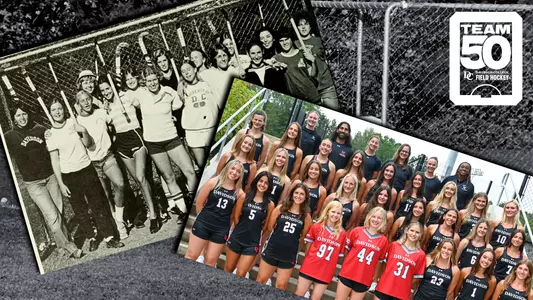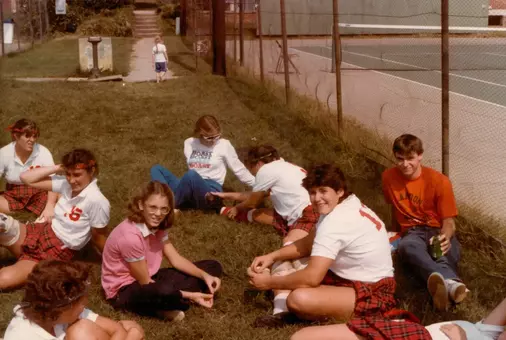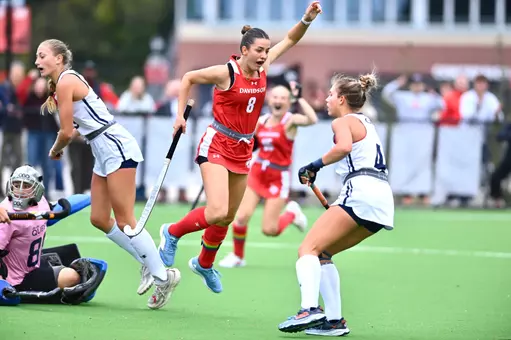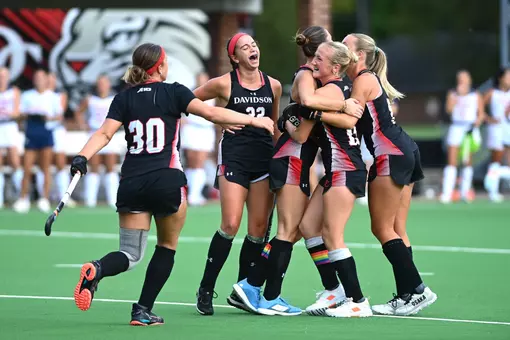
Then to Now: Marking 50 Years of Davidson Field Hockey
10/11/2025 9:48:00 AM | Field Hockey
Throughout this year, the Davidson field hockey program has celebrated the 2025 team's distinction as "Team 50," and for coach Zoe Almquist, that is more than just a milestone worth marking.
It's also about recognizing that there have been 49 other teams of like-minded Wildcats along the way, from 1976 to 2006 and beyond.
"It's really helped me keep the big picture in mind, thinking about how privileged we are to be the team that we are right now and knowing that we only get to walk in these shoes because the women before us blazed the trail," says Almquist, who is in her seventh year leading the Wildcats.
Team 50 Weekend commenced Friday with the Wildcats hosting Atlantic 10 foe Richmond. Alumni came to town to watch the game, tour facilities, rekindle old connections and make new ones during brunches, tailgates and a Sunday ceremony.
For Almquist, whose mother Shellee was the first varsity goalkeeper at the University of Michigan, honoring those who came before is something that is only fitting and proper. Her message to those alumni this weekend? It all boils down to "thank you."
"The smart and brave and inspired women that did this work before us, that came through and gave us this opportunity … we're just really grateful for them," says Almquist.
Looking Back
If you follow any Davidson Wildcat team in 2025, you have likely heard the name Susan K. Roberts.
Her name often comes up when program history is discussed, and at the very least, it's mentioned during awards season. The Susan K. Roberts Award is awarded annually to the female athlete who exemplifies the Davidson spirit in intercollegiate competition and campus leadership. Recent winners include volleyball players Izzy Decker (2025) and Anela Davis (2023) and swimmer Sylvia Stewart-Bates (2024).
Roberts, who goes by "Susie," coached many sports throughout her three-plus decade coaching career, also including basketball at Davidson. And she was the Wildcats' first field hockey coach, taking the reins at age 22 in 1976.
Roberts was studying biomechanics in graduate school at the University of Arizona when she heard about a basketball and field hockey coaching opening at tiny Davidson College in North Carolina. She had played both sports at Ohio University and went for it.
While a college athlete herself, Roberts had recorded extensive notes of her teams' drills and practices, knowing she'd one day reach for those notes as a coach.
"I had written down everything we ever did," says Roberts, who is now retired and living in Pennsylvania, not far from where she spent 29 years coaching multiple sports at Grove City College. "There wasn't a lot of material you could look at out there. You just made up things that would work for your group. That's what we did."
To the players on the inaugural team, Roberts was a rock star. With no assistant coach, she did everything from working extensively with players of all positions to posting motivational phrases on dormitory doors to surprising the players by having all their parents secretly come to a random road game. And she formed a team of players who were already on campus, from all kinds of experience backgrounds. Many were multi-sport athletes, like eventual Davidson Hall of Famer Kirk (Cameron) Ayars, a tennis standout who suggested to the administration that field hockey be added.
"We were just thrilled that Title IX provided us the means and opportunity to compete," says Cindy Curtis, a goalkeeper on the first team.
From Florida, Curtis was a swimmer and soccer goalie in high school. Her dorm mates encouraged her to learn the sport and the goalie position.
Bunny (Horine) Renaud had not played field hockey since middle school, but remembers Roberts helping her get up to speed. Belle (Erdman) Patton grew up near Philadelphia and had played field hockey since she was 12. The Davidson program started her freshman year, so she was happy to continue.
Roberts blended everyone together and led a team that surprised folks by going 7-2.
"I just tried to go off my experience, what worked for us and incorporated that into what we were doing," says Roberts. "The kids were just wonderful. We all knew we were working together to build something special. They all pitched in."
It wasn't easy. They played on a well-worn, bumpy grass field that was bordered by a steep slope on one side. Retrieving balls was always a chore. Practice clothing was whatever each player had available and didn't mind getting dirty. Gear was limited, but if sticks were needed, they were found.
"They were tough," says Roberts. "They didn't have a lot, but it didn't keep them from playing. They just wanted to play."
The players had access to trainer Tom Couch and professors made themselves available to help with studies after practice, when necessary. And quickly, bonds formed on the field, during camp in the Poconos and on road trips where players helped drive school vans. As multi-talented as she was, Roberts could only drive one van at a time.
In short, the Wildcats had a blast while blazing a trail.
"It was all about 'team,'" says Renaud. "I wouldn't have traded it for the world."
A New Era
Over time, college field hockey has changed many times over, nationally and close to home.
Offsides, roll-ins and three-tap bullies are things of the past, as are the grass fields, wool skirts and collared shirts.
But looking at her players and pictures from the program's past, Almquist sees the same pride, cohesiveness and sisterhood that has been there all along.
"The women who make up this team love each other, care about each other, have fun together," she says. "You can see it written all over their faces all the time. This team is a family, and that piece is core to our identity, core to our culture, core to how we approach each other, approach our alumni, our recruits."
In 2025, there are 83 NCAA Division I field hockey programs, and Davidson fields one of them. The Wildcats compete in the Atlantic 10 Conference, which regularly has one or two nationally ranked teams and last year had two teams, Saint Joseph's and then-member UMass, reach the Final Four.
With the completion of Davidson College Stadium and Game Changers Field House in 2024, the Wildcats' program is more centralized than ever with access to state-of-the-art facilities, including a weight room, training center, nutrition station and locker room.
And new artificial turf was installed at Carol Grotnes Belk Turf Field over the summer. It's the same AstroTurf PoliGras Platinum surface that is used at the Olympic level.
Davidson's roster includes 27 players from 12 states and four foreign countries, and the Wildcats have three assistant coaches, as well as a designated trainer and strength and conditioning coach.
It's a new era.
"It's a whole other game," says Roberts. "I am so happy they have what they have. I'm so proud of how far they've come in 50 years."
It's also about recognizing that there have been 49 other teams of like-minded Wildcats along the way, from 1976 to 2006 and beyond.
"It's really helped me keep the big picture in mind, thinking about how privileged we are to be the team that we are right now and knowing that we only get to walk in these shoes because the women before us blazed the trail," says Almquist, who is in her seventh year leading the Wildcats.
Team 50 Weekend commenced Friday with the Wildcats hosting Atlantic 10 foe Richmond. Alumni came to town to watch the game, tour facilities, rekindle old connections and make new ones during brunches, tailgates and a Sunday ceremony.
For Almquist, whose mother Shellee was the first varsity goalkeeper at the University of Michigan, honoring those who came before is something that is only fitting and proper. Her message to those alumni this weekend? It all boils down to "thank you."
"The smart and brave and inspired women that did this work before us, that came through and gave us this opportunity … we're just really grateful for them," says Almquist.
Looking Back
If you follow any Davidson Wildcat team in 2025, you have likely heard the name Susan K. Roberts.
Her name often comes up when program history is discussed, and at the very least, it's mentioned during awards season. The Susan K. Roberts Award is awarded annually to the female athlete who exemplifies the Davidson spirit in intercollegiate competition and campus leadership. Recent winners include volleyball players Izzy Decker (2025) and Anela Davis (2023) and swimmer Sylvia Stewart-Bates (2024).
Roberts, who goes by "Susie," coached many sports throughout her three-plus decade coaching career, also including basketball at Davidson. And she was the Wildcats' first field hockey coach, taking the reins at age 22 in 1976.
Roberts was studying biomechanics in graduate school at the University of Arizona when she heard about a basketball and field hockey coaching opening at tiny Davidson College in North Carolina. She had played both sports at Ohio University and went for it.

While a college athlete herself, Roberts had recorded extensive notes of her teams' drills and practices, knowing she'd one day reach for those notes as a coach.
"I had written down everything we ever did," says Roberts, who is now retired and living in Pennsylvania, not far from where she spent 29 years coaching multiple sports at Grove City College. "There wasn't a lot of material you could look at out there. You just made up things that would work for your group. That's what we did."
To the players on the inaugural team, Roberts was a rock star. With no assistant coach, she did everything from working extensively with players of all positions to posting motivational phrases on dormitory doors to surprising the players by having all their parents secretly come to a random road game. And she formed a team of players who were already on campus, from all kinds of experience backgrounds. Many were multi-sport athletes, like eventual Davidson Hall of Famer Kirk (Cameron) Ayars, a tennis standout who suggested to the administration that field hockey be added.
"We were just thrilled that Title IX provided us the means and opportunity to compete," says Cindy Curtis, a goalkeeper on the first team.
From Florida, Curtis was a swimmer and soccer goalie in high school. Her dorm mates encouraged her to learn the sport and the goalie position.
Bunny (Horine) Renaud had not played field hockey since middle school, but remembers Roberts helping her get up to speed. Belle (Erdman) Patton grew up near Philadelphia and had played field hockey since she was 12. The Davidson program started her freshman year, so she was happy to continue.
Roberts blended everyone together and led a team that surprised folks by going 7-2.
"I just tried to go off my experience, what worked for us and incorporated that into what we were doing," says Roberts. "The kids were just wonderful. We all knew we were working together to build something special. They all pitched in."
It wasn't easy. They played on a well-worn, bumpy grass field that was bordered by a steep slope on one side. Retrieving balls was always a chore. Practice clothing was whatever each player had available and didn't mind getting dirty. Gear was limited, but if sticks were needed, they were found.
"They were tough," says Roberts. "They didn't have a lot, but it didn't keep them from playing. They just wanted to play."
The players had access to trainer Tom Couch and professors made themselves available to help with studies after practice, when necessary. And quickly, bonds formed on the field, during camp in the Poconos and on road trips where players helped drive school vans. As multi-talented as she was, Roberts could only drive one van at a time.
In short, the Wildcats had a blast while blazing a trail.
"It was all about 'team,'" says Renaud. "I wouldn't have traded it for the world."
A New Era
Over time, college field hockey has changed many times over, nationally and close to home.
Offsides, roll-ins and three-tap bullies are things of the past, as are the grass fields, wool skirts and collared shirts.
But looking at her players and pictures from the program's past, Almquist sees the same pride, cohesiveness and sisterhood that has been there all along.

"The women who make up this team love each other, care about each other, have fun together," she says. "You can see it written all over their faces all the time. This team is a family, and that piece is core to our identity, core to our culture, core to how we approach each other, approach our alumni, our recruits."
In 2025, there are 83 NCAA Division I field hockey programs, and Davidson fields one of them. The Wildcats compete in the Atlantic 10 Conference, which regularly has one or two nationally ranked teams and last year had two teams, Saint Joseph's and then-member UMass, reach the Final Four.
With the completion of Davidson College Stadium and Game Changers Field House in 2024, the Wildcats' program is more centralized than ever with access to state-of-the-art facilities, including a weight room, training center, nutrition station and locker room.
And new artificial turf was installed at Carol Grotnes Belk Turf Field over the summer. It's the same AstroTurf PoliGras Platinum surface that is used at the Olympic level.
Davidson's roster includes 27 players from 12 states and four foreign countries, and the Wildcats have three assistant coaches, as well as a designated trainer and strength and conditioning coach.
It's a new era.
"It's a whole other game," says Roberts. "I am so happy they have what they have. I'm so proud of how far they've come in 50 years."
FY26 WFH Virtual Event
Tuesday, August 26
2022 Field Hockey Preview
Friday, August 26
2022 Field Hockey Preseason
Wednesday, August 17
Field Hockey Fall 2021 Season Preview
Friday, September 10








